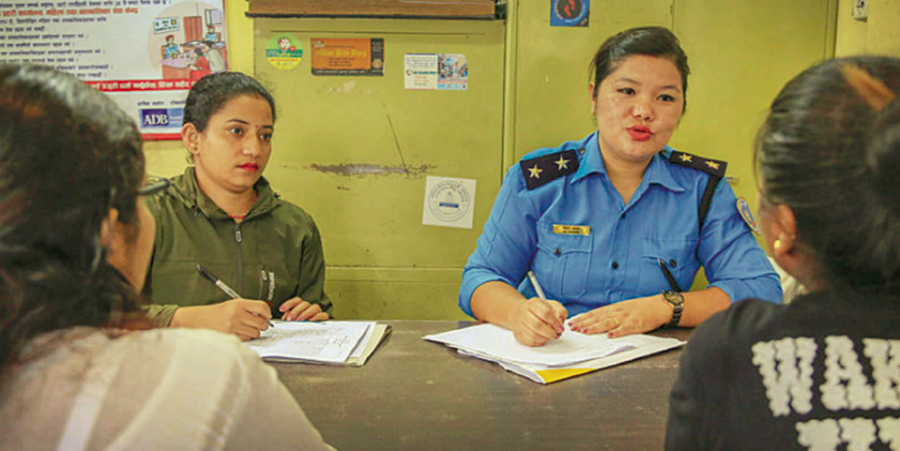National
In attempts to protect their colleagues, police don’t register first information reports against them
The latest of such examples is police in Garuda Municipality, Rautahat refusing to register a complaint against the death in custody of 19-year-old Bijay Mahara
Binod Ghimire
For the last 1o days the family of Bijay Mahara from Garuda Municipality in Rautahat, who died on August 26 midnight in course of treatment, with the support from human rights organisations has been trying to register a first information report against the local police personnel allegedly involved in his torture and subsequent death.
Each time they try to file the complaint at the Area Police Office, Garuda, where the 19-year-old was detained, or at the District Police Office, Rautahat, the police refused saying the report includes the names of the police officials not associated in the case.
The family and the human rights organisations have accused police at the Area Police Office headed by Deputy Superintendent of Police Gyan Kumar Mahato of resorting to excessive torture, which took Mahara’s life.
The police, however, have said it would register the report only if Mahato’s name is omitted from the complaint.
“The police are asking us to revise the complaint as per its convenience if we want the complaint to get registered,” Ram Binay Paswan, a local human rights activist, told the Post. “We won’t give up. How can we omit the name of Mahato under whose command everything happened?”
On August 16, police arrested Mahara, also called Bijay Ram, from his home in Garuda Municipality-8, Rautahat, along with 10 others over their alleged involvement in the murder of Niranjan Ram.
The family, who was never allowed to meet Mahara while he was in custody, was informed 10 days later on August 26 midnight that he died while receiving treatment for a kidney ailment at National Medical College, Birgunj.
The family and the local human rights activists claim he was tortured to death to force him to confess his involvement in the murder.
Following widespread criticism, inspector Nabin Kumar Singh and police constables F Feroz Miya Dhuniya and Mannu Kumar Singh have been suspended for their alleged involvement in the incident. But Mahato is in service although he has been transferred to Province 2 Police Office, Janakpur.
Following police refusal to file an FIR on Mahara’s death, a team of the human rights lawyers from Kathmandu has reached Rautahat to assist the family.
“We will make final attempts Tuesday, if it fails, we will move to the Supreme Court,” Sailendra Ambedkar, a lawyer with Tarai Human Rights Defenders
Alliance, a human rights organisation, told the Post.
Mahara’s case is not an isolated one.
On June 20 last year, police killed Kumar Paudel, Sarhali district in-charge of the Netra Bikram Chand-led Communist Party of Nepal. Though the police claimed he was killed in the police action, an investigation by the National Human Rights Commission showed it was a case of extrajudicial killing. It concluded that Paudel was killed after being taken into custody and called for actions against the police officials involved in the killing.
The police have neither implemented the recommendation of the constitutional human rights watchdog, nor have they accepted the first information report from the family.
“We forwarded the complaint through the post after the police refused our frequent requests to register it,” Hari Krishna Paudel, Kumar’s brother, told the Post. “We don’t know whether it has reached the police or it simply refused to receive it.”
Human rights organisations say there are several instances like Mahara’s and Paudel’s in which police have refused to register complaints thereby affecting investigations against police officials allegedly involved in criminal offences.
Gyanendra Shahi, coordinator of Nepali for Nepal an anti-corruption campaign, broke his leg in the police custody in May 2019 in police torture. The constitutional human rights watchdog too had concluded that police resorted to severe torture in the custody.
Neither the police nor the district attorney office ever registered the complaints against police officials who tortured Shahi.
“Despite legal provisions in place, police seldom register complaints against its officials. These are attempts to protect its staff,” Bed Bhattarai, secretary at the commission, told the Post.
The section 4 and 5 of the National Criminal Procedure (Code) Act, 2017 have provisions making Nepal Police responsible to register complaints. Complaints can be filed at district attorney offices or and district administration offices if the police refuse but this provision makes little difference as it is the police who investigate such complaints.
The family of Sambhu Sada, 23, who died in a police custody Sabaila Area Police Office in Dhanusha on June 10, filed the complaint at the office of the district attorney after refusal by the police. However, investigation into the case has not begun.
Bikash Basnet, programme manager at the Advocacy Forum Nepal, a human rights organisation, said when the police are compelled to start investigation it forms a team led by a police inspector while the cases are against his seniors.
“But there is no investigation in such cases,” he said. “Therefore, we demand the formation of an independent body to take complaints against the police and investigate such cases.”
Nepal Police, however, claim that it has been accepting the complaints against its officials.
“We have been accepting the complaints against our officials. We know even our officials can be involved in wrongdoings,” Senior Superintendent of Police Kuber Kadayat, Nepal Police spokesperson, told the Post.
He claimed they haven’t refused to register the complaints but when asked about Mahara’s and Paudel’s case he said he was not aware of developments regarding those cases.
“Those cases are now under the purview of provincial police,” he said.




 18.12°C Kathmandu
18.12°C Kathmandu














